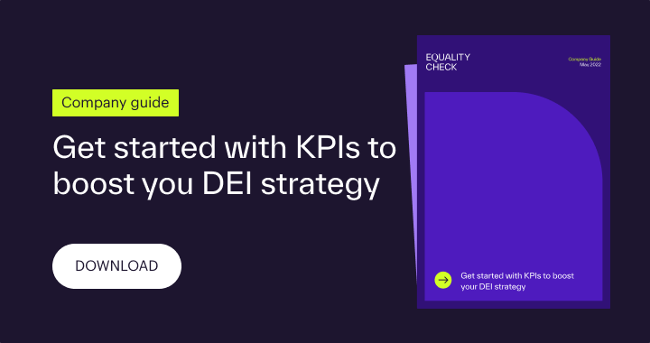In the last few years, a new wave of sustainability has emerged as the next global megatrend: diversity, equity, and inclusion (DEI). There are several good reasons for this. Gender equality has been on the agenda for many years, but there have been limited results. Empty promises, silo work and simple but often ineffective measures have been the standard. So while collectively everyone has wanted to get better - because it is the right thing to do - deep down, many have struggled to also believe that gender equality is the smart thing to do. Either way, we haven’t prioritised immediate performance-driven measures. Now, however, we’re finally seeing a clear change in the market. Several important drivers are now pushing forward a strong need to show actual commitment and quicker results.
Responding to growing competitive pressure and financial risk:
It’s now an established truth that companies which don’t deliver on equality and diversity loose a critical competitive edge. Mainly because they risk losing the fierce battle for talent. Millennials today make up the majority of employees, and we should all know now how much this generation puts equality and diversity high on the agenda. If you’re unable to offer a workplace that provides equal opportunities for all, alongside a healthy work-life balance and strong company culture, you’ll struggle to attract and retain talent. You’re then at risk of being left behind by the market, and the long-term negative impact spreading beyond your bottom line, as your organisation’s ability to deliver creative and innovative solutions reduces along with your talent pool.
For these reasons, many external actors are placing increasing demands in relation to equality and diversity performance. Many large companies are now stating their intention to not buy services from companies lacking either a clear balance or strategy when it comes to workplace DEI. Investors, banks and owners are making similar conditional demands when they invest. In other words, inequality and lack of diversity constitute a financial risk. And we can, with fairly high certainty, assume this risk will only increase in the future.
Social pressure and reputational risk:
Society also increasingly expects companies to take a clear stand when it comes to gender equality and diversity in external communication, for example around March 8 (International Women’s Day) and Pride, or social movements such as #MeToo and #BlackLivesMatter. Companies lacking a clear crisis and communication strategy for handling regrettable statements or internal discrimination cases, risk a damning verdict in the court of public opinion.
Regulatory pressure:
Finally, there is increasing regulatory pressure. For example, In Norway, the “activity and reporting obligation” (ARP) was extended in 2020, coming into full effect in the 2021 financial year. There are also similar regulations starting to appear across the EU and the UK, as well as other parts of the globe.
- In Norway, ARP requires all companies that meet the reporting criteria to complete a comprehensive survey annually of defined parameters.
- These include, for example: gender distribution in the company, gender pay gaps, use of temporary and part-time employees, and the distribution of allocated parental leave.
- Furthermore, companies must produce a written statement detailing how they’re working with broader diversity, what risk factors they have identified, and what actions they’re taking to remedy any imbalances.
- All private companies with more than 50 employees must report, and all public companies.
- The report is published in the annual report. The board is responsible for reporting.
While this is a comprehensive law, many companies and boards are not aware of their obligations, and are risking both fines and reputational risk if their failure to comply is discovered.
On an almost daily basis Equality Check speaks to Norwegian companies that are still unaware of the new reporting obligations and are consequently overwhelmed by the scope of reporting. We have therefore developed a tool that makes it easy to report according to the duty.
Regulation working as a intended
The great news is that regulatory pressure doesn’t have to be seen only as a burden. In fact, many Norwegian companies tell us how complying with ARP acted as the necessary catalyst to kickstart their efforts to introduce a more systematic approach to DEI. Most companies today have a genuine desire to succeed with workplace diversity and equality, but due to lack of data and internal expertise, they struggle. It’s still a myth-based and silo-driven approach to equality and diversity. As with all other business challenges, solutions are dependent on some basic premises for success:
- Work must be rooted in top management and part of overall corporate strategy
- It requires the right data together with sufficient domain knowledge to make the right diagnosis
- Implementation of measures that will actually have an effect
Regulations such as ARP are a first step in forcing companies to create a status quo report. We see that many companies are willing to use the insight to get better, and we think it is uplifting to see that so many take the challenge seriously.
What next after compliance and regulation?
The question is, what should companies do next after meeting regulatory requirements? Ultimately for companies that truly want to succeed with workplace DEI, compliance should be a minimum requirement. By submitting an annual compliance report, you’re setting out on the right track, but you’re no means close to your final destination. To take advantage of the competitive advantage that lies in equality and diversity and manage to avoid both financial risk and reputational risk, companies must do more than the bare minimum.
And today, the focus on gender equality has broadened to cover the full spectrum of diversity and equality at work. We help many employers with how to identify differences beyond gender, and understand how they can facilitate inclusion and belonging.
By combining the right data with domain expertise, companies can:
- identify opportunities to increase their value creation in the longer term
- understand which challenges pose the greatest financial or reputation risk
- use evidence-based solutions to minimise harmful impact
This growing global megatrend will ultimately benefit companies, their employees and society as a whole. The companies that learn to surf the wave now will be far ahead of their competitors in the near future. We are already seeing results in the companies that started last year. Those who do not take action today run a high risk tomorrow.
This article originally appeared in Norwegian publication Kapital and has been reproduced with permission. You can read the original Norwegian article here.

